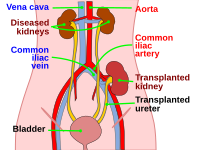
Skin microvascular dysfunction as an early cardiovascular marker in primary hyperoxaluria type I
Sign Up to like & getrecommendations! Published in 2018 at "Pediatric Nephrology"
DOI: 10.1007/s00467-018-4081-5
Abstract: BackgroundPrimary hyperoxaluria type 1 (PH1) is an orphan inborn error of oxalate metabolism leading to hyperoxaluria, progressive renal failure, oxalate deposition, and increased cardiovascular complications. As endothelial dysfunction and arterial stiffness are early markers of… read more here.
Keywords: dysfunction; ph1; ph1 cons; hyperoxaluria type ... See more keywords

Estimating health state utilities in primary hyperoxaluria type 1: a valuation study.
Sign Up to like & getrecommendations! Published in 2023 at "Journal of medical economics"
DOI: 10.1080/13696998.2023.2176678
Abstract: AIMS Quantitative data on health state utilities in primary hyperoxaluria type 1 (PH1) are lacking. This study was conducted to estimate utility values in PH1 using 3 standard valuation techniques. MATERIALS AND METHODS Health state… read more here.
Keywords: health; health state; ph1; state utilities ... See more keywords

Treatment options in primary hyperoxaluria Type I
Sign Up to like & getrecommendations! Published in 2017 at "Expert Opinion on Orphan Drugs"
DOI: 10.1080/21678707.2017.1298439
Abstract: ABSTRACT Introduction: Primary Hyperoxaluria Type I (PH1) is due to the deficiency of liver peroxisomal alanine:glyoxylate aminotransferase (AGT). The disease manifests as calcium oxalate stones that deposit at first in the kidneys and then in… read more here.
Keywords: primary hyperoxaluria; treatment; treatment options; ph1 ... See more keywords

Primary hyperoxaluria Type 1
Sign Up to like & getrecommendations! Published in 2020 at "Medicine"
DOI: 10.1097/md.0000000000020371
Abstract: Abstract Introduction: Primary hyperoxaluria type 1 (PH1) is a genetic autosomal recessively inherited disorder due to mutation in the alanine-glyoxylate aminotransferase (AGXT) gene. It usually presents in children with nephrolithiasis and/or nephrocalcinosis and progressive renal… read more here.
Keywords: ph1; primary hyperoxaluria; hyperoxaluria type; mutation ... See more keywords

Lumasiran for primary hyperoxaluria type 1: What we have learned?
Sign Up to like & getrecommendations! Published in 2023 at "Frontiers in Pediatrics"
DOI: 10.3389/fped.2022.1052625
Abstract: Primary hyperoxaluria type 1 (PH1) is a rare autosomal recessive genetic disorder caused by mutations in the AGXT gene. The hepatic peroxisomal enzyme alanine glyoxylate aminotransferase (AGT) defects encoded by the AGXT gene increase oxalate… read more here.
Keywords: primary hyperoxaluria; treatment ph1; hyperoxaluria type; ph1 ... See more keywords

Long-term outcome after combined or sequential liver and kidney transplantation in children with infantile and juvenile primary hyperoxaluria type 1
Sign Up to like & getrecommendations! Published in 2023 at "Frontiers in Pediatrics"
DOI: 10.3389/fped.2023.1157215
Abstract: Introduction Combined or sequential liver and kidney transplantation (CLKT/SLKT) restores kidney function and corrects the underlying metabolic defect in children with end-stage kidney disease in primary hyperoxaluria type 1 (PH1). However, data on long-term outcome,… read more here.
Keywords: long term; kidney; transplantation; ph1 ... See more keywords

Structural Insights Uncover the Specific Phosphoinositide Recognition by the PH1 Domain of Arap3
Sign Up to like & getrecommendations! Published in 2023 at "International Journal of Molecular Sciences"
DOI: 10.3390/ijms24021125
Abstract: Arap3, a dual GTPase-activating protein (GAP) for the small GTPases Arf6 and RhoA, plays key roles in regulating a wide range of biological processes, including cancer cell invasion and metastasis. It is known that Arap3… read more here.
Keywords: ph1; domain arap3; arap3 ph1; ph1 domain ... See more keywords